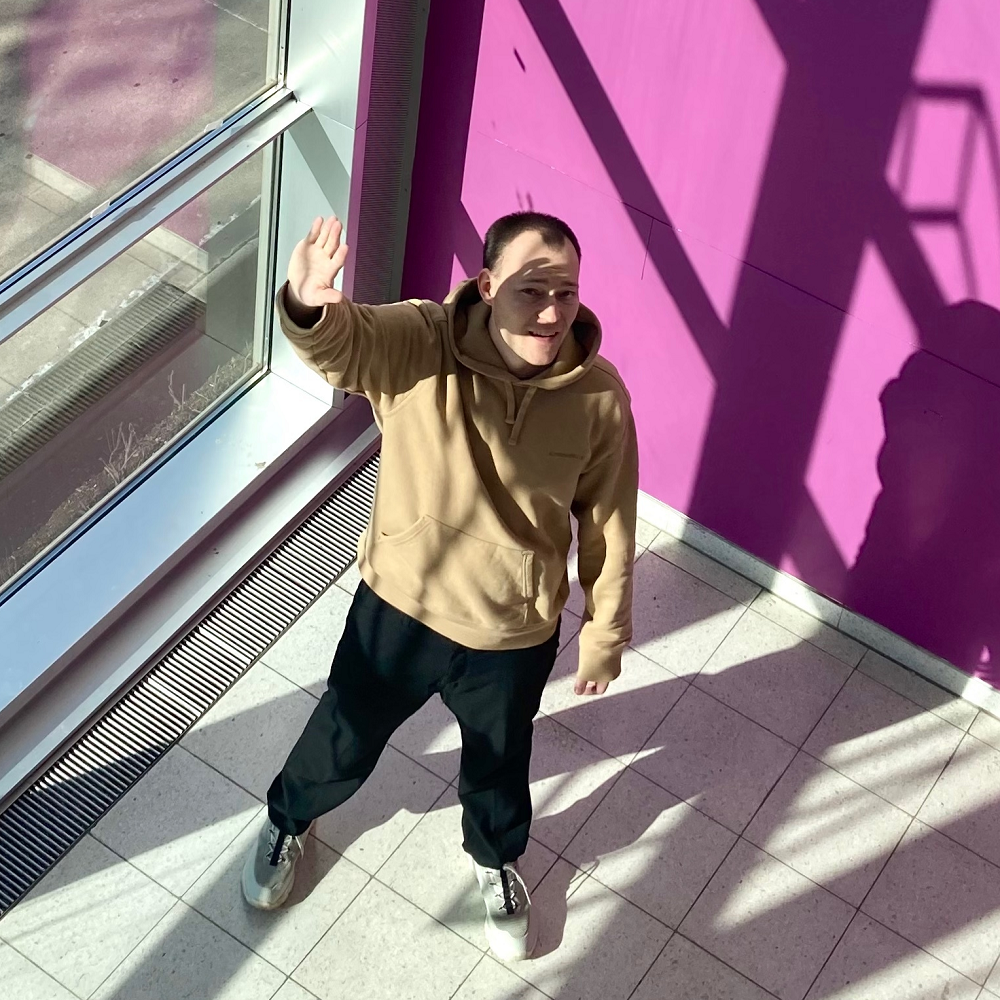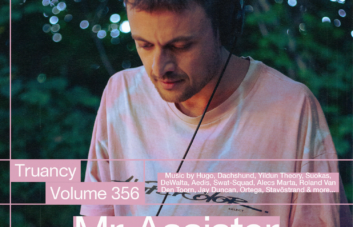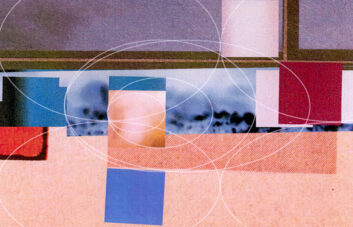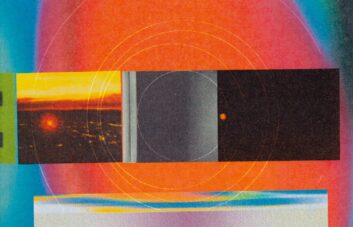For Vienna’s electronic music scene, Florian Stöffelbauer (otherwise known as Heap) is something of a local hero. As a DJ, producer and label head, Florian has an acute knowledge of the weird and wonderful. The term ‘digger’ is thrown around frequently, often with pompous connotations. While his crates run particularly deep, Florian’s far from pretentious; his diverse and humble approach to music is centered around sharing his passion with an equally dedicated community. Working under the alias Heap, he has crafted a low-slung industrial sound that is now emblematic of my clubbing experience in the Austrian capital. The signature leftfield chug of his productions appear on ESP Institute and Berceuse Heroique as well as his own label, Neubau. DJing under his birth name meanwhile, he regularly unearths previously forgotten Austropop gems, the outer reaches of krautrock and synth-pop treasures.
At the beginning of the pandemic, Florian was in the process of opening Bestand, a music, arts and culture centre he’d conceptualised with his close friend Samo Zeichen. The space plays host to Vienna community radio station RES.Radio and was intended to host a variety of listening events and exhibitions as well as provide a platform for discussion on social topics. Whilst the vast majority of the programming is on hold, and with RES.Radio’s residency in the space, it remains an opportunity for disparate, creative communities to interact and hopefully form something greater than the sum of all their parts. We caught up with Florian some months ago to discuss the project, the burgeoning Vienna scene and what he’s been working on amidst the pandemic.
I was interested to read in your Stamp The Wax interview that you used to play the drums. Were you somebody that grew up playing in bands and what sort of music were you playing at the time? “Rather than playing in bands, for a long time I was playing my drums in our local city orchestra, which was pretty well known around Upper and Lower Austria for its sound and talented members. When I turned 17 I started a band with some of my colleagues from the orchestra – we played indie rock with German lyrics. It came a bit too early for the audience, considering the revival of Austropop started only around 3 to 4 years later.”
How was your transition into more electronic-focused music? What were some of the artists that paved the way for that transition? “At the same time I got into electronic music and was trying to add this to our band sound too. My preferred sound came from the UK, especially early dubstep and DJs like Ben UFO, who is still one of the artists I look up to the most. Boiler Room had only started a short time ago back then and I was listening to lots of their recordings.
“I remember buying a NI Maschine at that time to be able to make our band sound more electronic, but it didn’t really work out well. After some time I started buying my first records and got more interested in DJing. I bought DJing equipment from a friend in my home town and started practicing. For a long time I was only playing records for myself until I came to Vienna and met people who pushed me into playing in front of an audience. I have to thank Michael Weiler and Daniel Hartl (Sedvs, who is running Bare Hands records) for this, without them I wouldn’t have got involved in the Viennese music scene.”
Are you still working within Ableton? What does that production process look like for you? “When working on my own music I’m still working with Ableton only. After my initial plans of gathering hardware and only starting to make my own music once I got the gear I had in mind, I became a bit impatient because as a student I didn’t have enough money to buy all the machines I wanted. My very good friend Mr. Ho used to live in Vienna at that time and he invited me to do a jam session together, teaching me the fundamental Ableton usage. Many sessions later we suddenly had finished pieces which we were lucky enough to be able to release on Lovefingers’ ESP Institute.”
Coming from that instrumental background do you ever feel that there’s something lacking now you operate more in a production-focused environment? Drums are quite a physical outlet whereas working in Ableton or other DAWs often involves sitting at your laptop for extended periods of time. “I for sure miss the physical part of playing the drums, but with just one instrument I was limited in sound. With Ableton I could turn my ideas into a full song rather than just recording the drums track. It was also nice to instantly have my ideas for beats programmed and saved.”
Speaking to people over the last few months it’s felt like there’s a certain apathy to more ‘club-focused’ music, given the inability to listen to that music within the environment it was made for. We’ve been fairly fortunate in Austria with regards to regulations but I’m curious to hear how the past year has been for you. How have you coped and what music have you been digging out during these times? “In general I have felt a decrease of interest in the club scene and the music that goes along with it, which is fair enough since almost everyone (including me) was more or less forced to reflect on their life and shift their focus to more important things. I’m lucky enough not to depend on income from my musical projects only, due to my full-time job. Lots of my friends for sure had or still have a tough year financially though and I hope that the governments will create packages to save, not only electronic music culture, but culture in general.
“After the last wave of new releases before last summer I also felt that a lot of labels postponed their releases they had still planned for 2020. From my experience I can say it became more difficult to sell out releases of the usual pressing quantity. Surely not only because of the pandemic, before there was already a trend to digital purchases. I wouldn’t say less club-focused releases saw the light of day but maybe labels saw a chance now for conceptual albums made for home listening or listening in special and more intimate surroundings.
“For my part, I still kept my digging routine alternating between physical record shops in Vienna, flea markets, Discogs and Bandcamp and didn’t limit myself to certain genres or moods of music, as always.”
At the start of 2020 you launched the Vienna-based creative space Bestand, which hosts community radio station RES.Radio, exhibitions, film screenings and performances. Can you talk a little bit about the space and the community model around it? “We were pretty excited to start this project. My very good friend Samo and me have already been talking about opening our own space for a long time, having prepared a concept on paper and dreaming about starting a spot gathering many of Vienna’s most interesting minds in various artistic fields. One day Samo heard about a project for temporary use in a former hospital and we applied with our concept. We were accepted and rented two rooms in the building, one being sub-rented to RES.Radio. We worked pretty hard to get the room in shape for our ideas, Samo organised an amazing sound system and I invested in XDJs.
“We had planned our first event with Philipp Otterbach, organised by my label partner Florian Bocksrucker, a week before the first lockdown started. So our start had to be postponed and we didn’t have an official opening event yet but were able to have a soft start into this project with some smaller listening gatherings, exhibitions, concerts, workshops, etc. This was better for Samo and me looking at it now, because we would have to admit that we were not prepared well enough for weekly public shows back in March but now know what it needs to plan for almost unpredictable troubles and work in a more professional way.
“Our rental agreement is only valid until the end of 2020 but we might get the chance to extend it until August 2021, which will hopefully give us the possibility to catch up on a lot of things we had already planned for this year.”
[Editor’s note – the rental agreement was extended]
What sort of events have you hosted so far and how has the reception been? “We had a couple of listening sessions, label nights or exhibitions, one was focused on Viennese label Westbahn Records and featured label heads Noel Dinse & Leonard Prochazka and affiliate Simon Heidemann. Also we held a screening of Binta Giallo, an exhibition of Conny Frischauf and started our own Novelle 9 series.”
Despite its reputation as the most liveable city in the world, Vienna feels like something of an underrated gem from a local scene perspective – maybe because you don’t see much focus placed here from international music media. What are some of the things that you find appealing about the city? “You are definitely right about the lack of coverage about the Austrian and Viennese electronic music scene. In my opinion it was and is still too much focused on the UK, Berlin and Amsterdam. A lot of good things are happening there, no question, but it is easy to overlook other amazing microbubbles and artists. One example would be Georgia, so many cool projects have been popping up recently. And in Vienna there has been constant good musical output for the last decade, the only thing we are really struggling in is finding spots to present our music, but that’s due to the political situation and existing laws respectively with uncomfortable, narrow-minded neighbors.
“Vienna is an underrated gem since a long time, I have seen so many different countries and cities during the last couple of years and I never wanted to live anywhere else than Vienna. The most appealing thing about Vienna is the atmosphere created by the people spreading ‘Gemütlichkeit’ and the architectural beauty. It feels a bit like everything happens in slow motion. You will never get it anywhere else.”
The club scene in Vienna often feels quite serious and that it seems there’s less room for ‘drawing outside the lines’ or more oddball selections. Would you say this is a misinterpretation? “I agree, many of the clubs only want to make profit or have to make a certain amount because of their size. The smaller clubs we have are mostly bars with a little sound system, you cannot really have a proper party vibe there. We are still missing a mid-sized spot focussed on good sound and oddball selection when it comes to bookings.”
Let’s talk about your Lumière du Côté Obscur compilation. How did it come about and what was the process for compiling it? “Throughout the years I gathered a lot of music that has been overlooked back at the time it was released or even has never been released before. This was a result of me contacting artists and label operators or producers from back in the days. They gave me promo copies and unreleased material which I was playing in my sets but at some point I felt it would be too sad not to share the music with everyone. So I had the idea of unconventionally putting music of different eras and genres together on a small compilation.”
The compilation was released as a CD and digital. What was the thinking behind not doing a vinyl release? “I didn’t have money to invest in a whole vinyl production on my own and wanted to try CD for a while. Also, since I started working at a digital distribution I became interested in the process and how this kind of music would be received in the digital world of music nerds.”
Working for a digital distribution company, as somebody whose output is so closely related with vinyl, what have you learnt working on that side of the industry? “To me it was a whole new world. Especially the world of streaming. I never used any of these services personally and still don’t now, but I understand much better now how it works and the big influence it has on how certain releases perform. It’s a bit crazy and surreal because it’s pure consumption. If there is ‘fast fashion’ I guess now there is also something like ‘fast music’ with all those streaming portals, playlists and ‘playlist influencers’.”
Are you somebody who buys vinyl because you have a particular affinity to that format or out of necessity i.e. it’s not available digitally? “I like to collect physical pieces of music. Whenever I find interesting music that I like a lot, I check for vinyl copies first, before I buy digitals. I really enjoy seeing a coherent sleeve design and the process of taking that piece of music out of a sleeve, putting it on a device and starting the playback. To me this is the alternative draft to ‘fast music’.”
We haven’t talked about your label Neubau that you run alongside Bocksrucker. What have you guys got coming up in the next months? “Unfortunately our schedule for 2020 was smashed by Coronavirus. But we prepared a nice limited edition 10’’ release which will be the first of a special series. Hopefully it will be ready by early 2021 and after that we want to continue with our schedule we had in mind for the next year.”
Are there any other projects from friends in the city that you’d like to shout out? “Rather than their projects I want to bring out their amazing personalities. I want to thank my closest friends for their constant support, especially during these times. Thanks Samo and Flo! Without Samo, Bestand wouldn’t have been possible to be realised. Flo Bocksrucker is the perfect partner to run a label with, we have the same vision of how we want to present music and I love sharing and discussing ideas with him. We mutually give honest feedback on ideas and drafts of musical projects, graphics, etc. to each other, which I think is the most important in a common project.
“Thanks to my girlfriend Svitlana for making me feel happy every single day and for supporting us with your graphic design skills. Without her the Lumière du Côté Obscur release wouldn’t be looking so good.
“It’s great that in our Viennese scene it feels like everyone is working on the same project: To spread good music and an important message. Our scene is very inclusive thanks to the amazing people being part of it. Additional shouts to Paul, Conny, Paul, Li, Ena, Lenny, Ben, Noel, Ali, Armin, Zoe…”
Heap: SoundCloud, Facebook, Instagram
Feature photograph courtesy of the artist.




